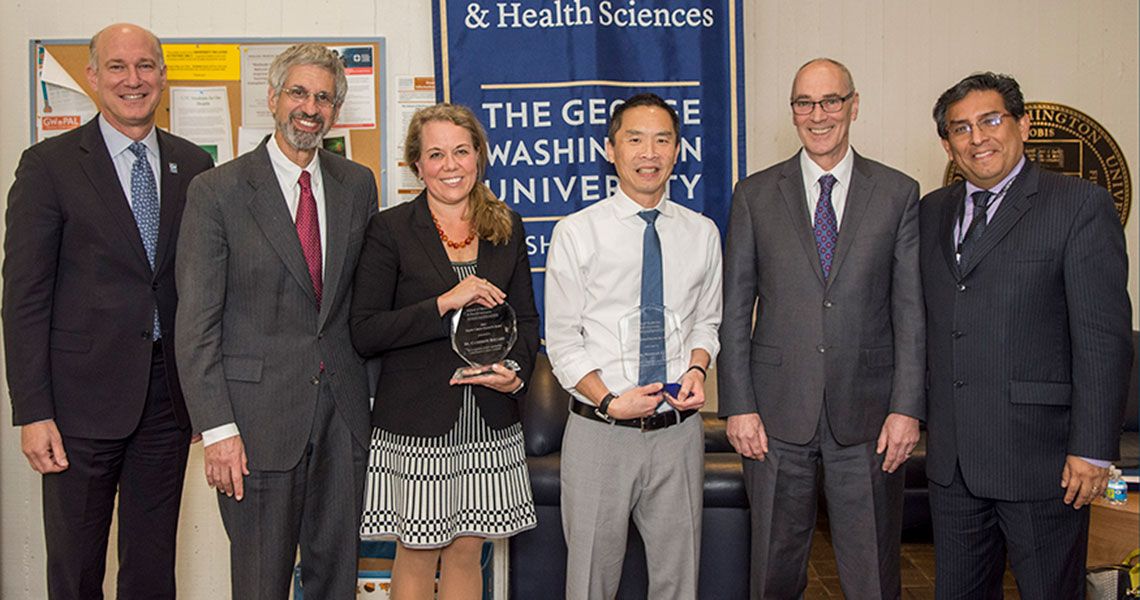Cancer researchers, Norman Lee, PhD, and Catherine Bollard, MD, at the George Washington University (GW) School of Medicine and Health Science (SMHS), were recently recognized for their work at the Faculty Research Awards. Lee’s research has looked into the role of differential gene splicing in the prostate cancer disparities, while Bollard’s focus has been in developing more effective immunotherapies.
On Nov. 7, Robert H. Miller, PhD, senior associate dean for research and Vivian Gill Distinguished Research Professor at SMHS, presented the two awards at the Faculty Research Awards ceremony. The awards are designed to recognize the success and preeminence of faculty and the research that they conduct here at GW.
“Thinking about what it means to be preeminent … it’s essentially recognition,” said Miller. “If we don’t recognize those within our community appropriately, we shouldn’t expect the scientific community to recognize us from the outside.”
Lee, a professor of pharmacology and physiology and of biochemistry and molecular medicine at SMHS, is a “triple-threat,” according to Miller, who noted his “world-class research, help in training the next generation of researchers, and help building our institution.”
Lee received the Distinguished Researcher Award for his investigation of differential alternative splicing as a mechanism in prostate cancer disparities.
RNA splicing is the editing of nascent precursor messenger RNA in which exons are joined together to form a mature mRNA. The different combinations of exons can lead to proteins of different function. “Ninety-five percent of genes in a human genome undergo differential splicing. A given gene is estimated to produce four or five alternatively spliced mRNA variants,” Lee explained at the ceremony.
To understand the splicing landscape, Lee and his team compared African American and European American prostate specimens. They identified approximately 1,000 genes that were differentially expressed, but not spliced. They also identified about 2,500 genes that did undergo differential splicing.
“That’s almost a 2:1 ratio of differentially spliced genes to differential gene expression,” said Lee. “What we take from that is, perhaps differential splicing represents a more important and relevant mechanism as opposed to simple gene expression when it comes to prostate cancer disparities.”
Bollard, the director of the Center for Cancer and Immunology Research at Children’s National Health System (Children’s National) and professor of pediatrics and of microbiology, immunology, and tropical medicine at SMHS, received the Snyder Cancer Research Award for her work using antigen-specific T-cells for the treatment of patients with lymphoma and acute leukemia.
Much of Bollard’s work, Miller said, is in generating populations of T-cells that can harm tumors in an effective way without the complications seen with pharmacological treatments. The focus of Bollard’s talk was on modalities of immunotherapeutic strategies and overcoming the immune suppressive tumor microenvironment using genetically modified T-cell and natural killer cell therapies.
“These immunotherapeutic treatments will probably need a combinatorial approach, like we did with chemotherapy,” Bollard explained. “If we move to an immunotherapy-focused strategy, we will need to combine different kinds of approaches that can enhance anti-tumor immunity in patients with cancer.”
Coming from Baylor College of Medicine to GW SMHS and Children’s National, Bollard and her team set up a trial using tumor-associated antigen T-cells in patients post-allotransplant and mostly with acute myeloid leukemia. She also discussed a potential trial, similar to her previous work, on mantle cell lymphoma in partnership with Kieron Dunleavy, MD, head of the GW Cancer Center’s lymphoma team and professor of medicine at SMHS and Eduardo Sotomayor, MD, director of the GW Cancer Center.
“There are multiple targets where we could look to combine strategies,” said Bollard. “One area that we are interested in is combining with epigenetic modifiers. That’s another really nice collaboration [with Sotomayor].”



